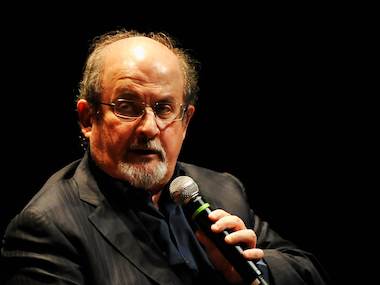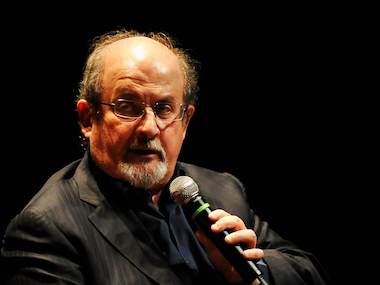Author Salman Rushdie has
won a battle with Facebook
, which first deactivated his account and then reinstated it with the name “Ahmed Rushdie” after asking him to send a copy of his passport for identity verification. “Facebook deactivated my account because they thought I wasn’t me,” he
explained on his page
. “Now they insist I call myself by the first name I have never used. What a bunch of morons". What had happened was that after Rushdie sent a copy of his passport to the social media site for verification, they reinstated the account with Rushdie’s given first name Ahmed - which he never used. An outraged Rushdie took to Twitter after repeated attempts to get in touch with Facebook saying, “Have been trying to get somebody at Facebook to respond. No luck. Am now hoping that ridicule by the Twitterverse will achieve what I can’t.” [caption id=“attachment_131290” align=“alignleft” width=“380” caption=“Rushdie took to Twitter to mobilise support against Facebook’s first name policy. Getty Images”]
 [/caption] Then in a series of tweets (which were then retweeted by thousands of followers) Rushdie made a case for authors and other well known celebrities who were using their middle names. “Good idea. Dear #Facebook, forcing me to change my FB name from Salman to Ahmed Rushdie is like forcing J. Edgar to become John Hoover” “Or, if F. Scott Fitzgerald was on #Facebook, would they force him to be Francis Fitzgerald? What about F. Murray Abraham?” “An interesting list: Middle Name Users. James “Paul” McCartney, Francis “Scott” Fitzgerald, Edward “Morgan” Forster… more? #Facebook” Finally Facebook relented and reinstated the account with the name “Salman Rushdie” prompting him to tweet, “Victory! #Facebook has buckled! I’m Salman Rushdie again. I feel SO much better. An identity crisis at my age is no fun. Thank you Twitter!” Facebook’s strict ‘real names’ policy that prompted the entire mess up has resurfaced the debate of the right to choose identity, particularly online. The New York Times
has an interesting article
on the issue and it says,"
[/caption] Then in a series of tweets (which were then retweeted by thousands of followers) Rushdie made a case for authors and other well known celebrities who were using their middle names. “Good idea. Dear #Facebook, forcing me to change my FB name from Salman to Ahmed Rushdie is like forcing J. Edgar to become John Hoover” “Or, if F. Scott Fitzgerald was on #Facebook, would they force him to be Francis Fitzgerald? What about F. Murray Abraham?” “An interesting list: Middle Name Users. James “Paul” McCartney, Francis “Scott” Fitzgerald, Edward “Morgan” Forster… more? #Facebook” Finally Facebook relented and reinstated the account with the name “Salman Rushdie” prompting him to tweet, “Victory! #Facebook has buckled! I’m Salman Rushdie again. I feel SO much better. An identity crisis at my age is no fun. Thank you Twitter!” Facebook’s strict ‘real names’ policy that prompted the entire mess up has resurfaced the debate of the right to choose identity, particularly online. The New York Times
has an interesting article
on the issue and it says,"
As the Internet becomes the place for all kinds of transactions, from buying shoes to overthrowing despots, an increasingly vital debate is emerging over how people represent and reveal themselves on the Web sites they visit. One side envisions a system in which you use a sort of digital passport, bearing your real name and issued by a company like Facebook, to travel across the Internet. Another side believes in the right to don different hats — and sometimes masks — so you can consume and express what you want, without fear of offline repercussions".
The Open Rights Group , which is an organisation that looks at safeguarding online rights has this to say on the issue:
Privacy is a fundamental right for a very strong reason. It is essential for individuals to have control of their personal lives and to be free from invasion and surveillance in order to feel free from threat, particularly from the state. Our freedom of expression relies on privacy. When privacy is removed, so is the ability to speak and associate freely.
Both Google and Facebook are staunch supporters of the ‘real names’ policy. In fact the firm stand taken by Google on this issue when it launched Google+ created a lot of controversy, prompting Firstpost writer Suw Anderson to say that the policy was seriously flawed as many respected bloggers and activists in the online space used pseudonyms. Twitter on the other hand is much more amenable to people using fake names on its service. Even in the Indian twittersphere, some of the most popular Twitter handles are in fact blatantly ‘fake’ identities. S atan Bhagat for instance is a living parody of author Chetan Bhagat and the fake Rakesh Jhunjhunwala (who claims to have invented Twitter) has almost 38,000 followers. Funnily enough even Salaman Rushdie who is at the centre of this particular storm regarding real identity was at the receiving end of Twitter’s lax policy of allowing users to choose any name they want. He had to get Twitter to stop an impersonator from tweeting as “Salman Rushdie” and now has a true-blue verified account. The debate on the issue is likely to continue, as arguments for and against both stands continue to be expressed. This is undoubtedly an important milestone in determining what the future of the web will look like. The best and easiest solution of course is a compromise - some kind of middle path, but exactly at what point of the debate this can happen is still unclear.
)